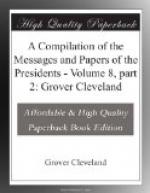In the interval which must elapse before the effects of the act of March 3, 1883, can be definitely ascertained a portion at least of the surplus revenues may be wisely applied to the long-neglected duty of rehabilitating our Navy and providing coast defenses for the protection of our harbors. This is a matter to which I shall again advert.
Immediately associated with the financial subject just discussed is the important question what legislation is needed regarding the national currency.
The aggregate amount of bonds now on deposit in the Treasury to support the national-bank circulation is about $350,000,000. Nearly $200,000,000 of this amount consists of 3 percents, which, as already stated, are payable at the pleasure of the Government and are likely to be called in within less than four years unless meantime the surplus revenues shall be diminished.
The probable effect of such an extensive retirement of the securities which are the basis of the national-bank circulation would be such a contraction of the volume of the currency as to produce grave commercial embarrassments.
How can this danger be obviated? The most effectual plan, and one whose adoption at the earliest practicable opportunity I shall heartily approve, has already been indicated.
If the revenues of the next four years shall be kept substantially commensurate with the expenses, the volume of circulation will not be likely to suffer any material disturbance; but if, on the other hand, there shall be great delay in reducing taxation, it will become necessary either to substitute some other form of currency in place of the national-bank notes or to make important changes in the laws by which their circulation is now controlled.
In my judgment the latter course is far preferable. I commend to your attention the very interesting and thoughtful suggestions upon this subject which appear in the Secretary’s report.
The objections which he urges against the acceptance of any other securities than the obligations of the Government itself as a foundation for national-bank circulation seem to me insuperable.
For averting the threatened contraction two courses have been suggested, either of which is probably feasible. One is the issuance of new bonds, having many years to run, bearing a low rate of interest, and exchangeable upon specified terms for those now outstanding. The other course, which commends itself to my own judgment as the better, is the enactment of a law repealing the tax on circulation and permitting the banks to issue notes for an amount equal to 90 per cent of the market value instead of, as now, the face value of their deposited bonds. I agree with the Secretary in the belief that the adoption of this plan would afford the necessary relief.




